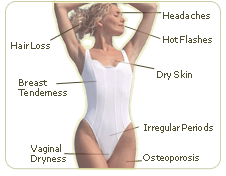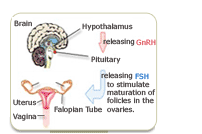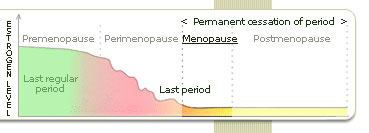34 MENOPAUSE SYMPTOMS |
HEALTH CENTER |
|
| |
|
|
|
|
|
|
The dramatic hormonal changes of the menopause transition trigger a variety of physical and psychological menopause symptoms, which can appear as early as in a woman's thirties. Menopause symptoms continue to intensify in the years leading up to menopause, after which they usually die down. Many women fear their menopause symptoms may signal a more serious problem, but they should rest assured that the menopause symptoms are completely normal. Keep reading to learn more about the 34 menopause symptoms. |
|
The 34 menopause symptoms are caused by declining and fluctuating hormonal levels. Hormones like estrogen, progesterone and testosterone are extremely powerful agents that exert a potent influence on several areas of the body. In the years leading up to menopause, lower and lower levels of these hormones are produced, although hormonal levels may periodically shoot up to higher than normal levels. After menopause, hormonal levels will stop fluctuating and steady out at significantly reduced levels.
The menopause symptoms are highly variable, but can be classified in the following manner: |
 |
|
|
The following are the most commonly experienced menopause symptoms reported by the majority of women going through menopause.
|
• Hot flashes
• Night sweats
• Irregular periods |
• Loss of libido
• Vaginal dryness |
|
As hormonal levels fluctuate during menopause, women will notice that their bodies, as well as their energy levels and even the way they think, are changing. These menopause symptoms include:
|
• Crashing fatigue
• Difficult concentrating
• Hair loss |
• Sleep disorders
• Weight gain |
|
Estrogen hormones don't only affect the body, but the brain as well. As estrogen fluctuates during menopause, a variety of emotional symptoms can appear. The following are the most common psychological menopause symptoms:
|
• Anxiety
• Depression
|
• Memory lapses
• Mood swings |
|
|
|
|
|
Among some of the most troublesome menopause symptoms are those that cause physical pain. Although the disease osteoporosis is not painful in itself, it puts menopausal women at a high risk for painful bone fractures and breaks. Painful menopause symptoms include:
• Breast tenderness • Osteoporosis
• Migraines and headaches
In addition to the symptoms listed above, there are less common, miscellaneous symptoms that may be experienced during different stages of menopause. Keep reading to learn more about different treatments for menopause symptoms.  |
|
Most women will experience at least some of these menopause symptoms, but they don't have to resign themselves to living with them. A variety of solutions can alleviate menopause symptoms. Keep reading to learn more. |
|
|
|
|
Treating Menopause Symptoms with
MacaActive Supplements |
|
Hormones play an essential role in several areas of the body. When hormone levels decline during menopause, the health implications can be significant, and often even more so for women who go through early menopause. As women begin to notice the symptoms of hormone deficiency, they may want to consider taking steps to stabilize their hormonal production.
Today, there are three effective ways to normalize hormonal levels: lifestyle changes, alternative medicine and drugs & surgery.
|
|
 |
Lifestyle Changes: This first level of treatment involves no risk, but may be the hardest way to go because you'll have to restrict yourself from many things. That's why most people consider the next level of treatment, alternative medicine, which has proven to be excellent for treating menopausal symptoms in a safe and natural way.
|
|
 |
Alternative medicine: There are two types of herbal supplements for treating menopause symptoms: those containing phytoestrogenic herbs, and those containing non-estrogenic herbs. Phytoestrogenic herbs (like Black Cohosh) are filled with phytoestrogens, which are similar to estrogens. They can increase low estrogen levels by replacing some of the missing estrogen hormones. This isn't the best solution, however, because your body will become less responsive to producing estrogen on its own, causing a further decrease in body-own hormone levels. Unlike phytoestrogenic herbs, non-estrogenic herbs don't contain estrogen, but they nourish the hormonal glands to work more efficiently. This ultimately results in balancing not only estrogen, but other necessary hormones, as well. Using non-estrogenic herbs is one of the safest and best ways to treat menopause symptoms naturally.
An excellent example of a safe and effective non-estrogenic herb for hormonal imbalance is herbal MacaActive. What makes MacaActive so special is its ability to balance hormonal levels in women by nourishing the hormonal glands. In this way, it alleviates most symptoms related to hormonal imbalance.  to read more about MacaActive. to read more about MacaActive.
|
|
 |
Drugs and Surgery: This level of treatment has the highest risk and often the highest cost. The most common drug therapy for treating menopause symptoms in the US is hormone replacement therapy (HRT). There's no doubt that this is the quickest and strongest way to combat hormonal imbalance. Unfortunately, it entails serious side effects and increases the risk of different types of cancer in women. If you still want to consider this approach, see your doctor to become better informed about what this treatment option involves.
|
|
A safe way for balancing hormones:
Non-estrogenic herbs are the most effective solution for treating hormonal imbalance and its related symptoms.
MacaActive is an excellent non-estrogenic herb. It's simple: rather than putting hormones from the outside into your body artificially, MacaActive stimulates your hormone glands into producing the necessary hormones naturally. This is what makes MacaActive supplements so unique.  to read all about MacaActive. |
 |
|
 |
|
menapause
menopausal
symptoms
depression
herb
herbal
herbs
hormone
hot flash
hot flashes
menopause
relief
symptoms
treatments
natural
mood |
signs | |
| |
Copyright� 2008 - - All Rights Reserved |
|
|


![]()




